Acquiring a college degree—both on-campus and online—can be financially challenging. With tuition costs averaging $21,950, a four-year public institution isn’t cheap! Virtual students who are on living and travel expenses still find the median $16,580 tuition fee for online degrees expensive.
Thanks to college grants, millions of students have a way to reduce college costs.
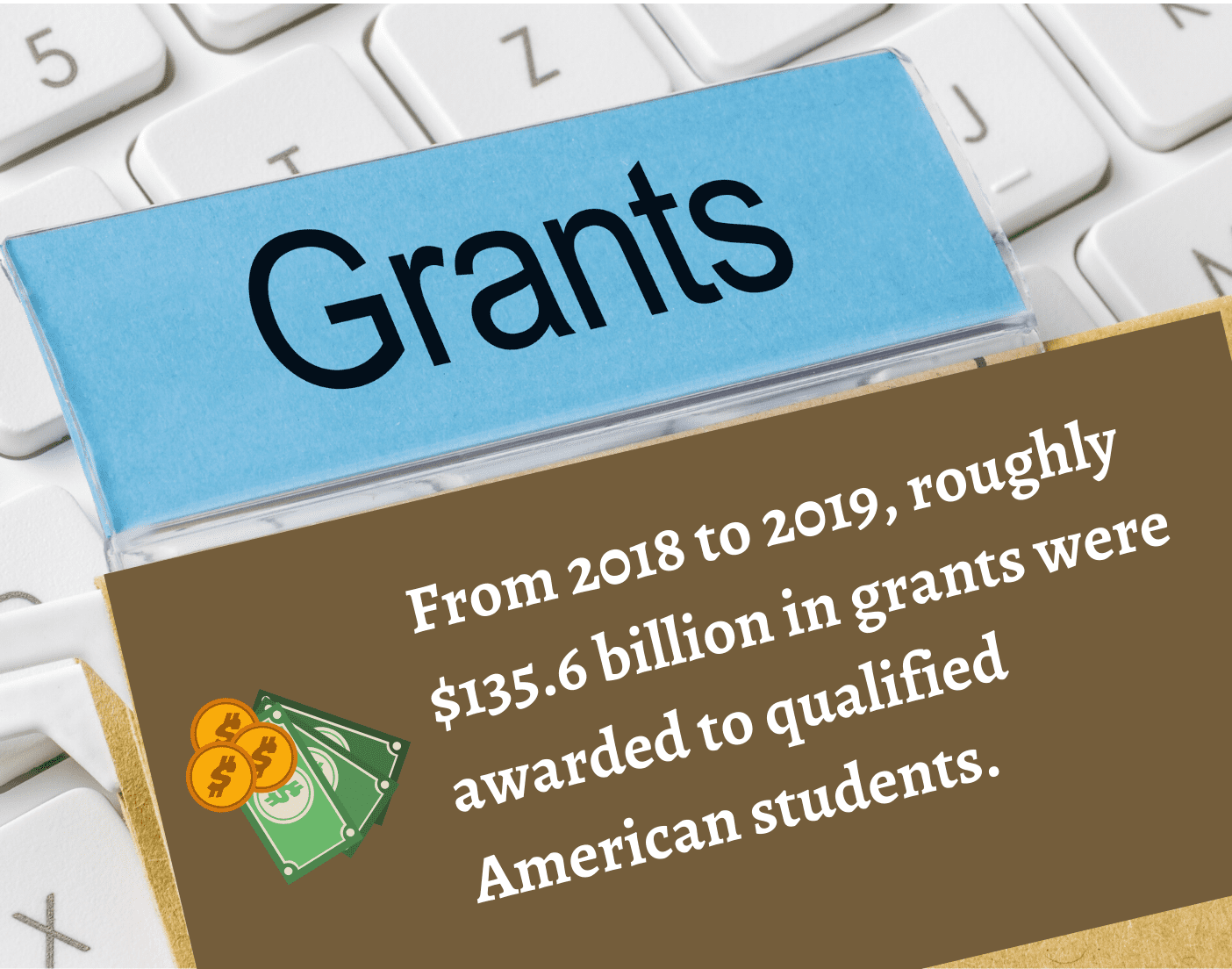
Grants are a type of college financial aid that, subject to conditions, may not require repayment. They are open opportunities funded by different sources such as colleges, the state, and the federal government. From 2018 to 2019, a total of $135.6 billion in grants was awarded to numerous qualified American students.
As distance learning has become increasingly prevalent, so does a deserving student’s need for an online college grant. In the past, the federal government would require grant-seeking online students to take half of their classes inside the campus to be qualified for assistance.
Following an update in the U.S. government policy, students can now take their courses full time in a virtual environment and still qualify for college grants.
Explore these page jumps to learn more about grants for online study:
Online College Grants vs. Scholarships
Online Grants: Need-Based or Merit-Based
Popular Online College Grants
* Federal Grants
* State-Sponsored Grants
* Institutional Grants
* Grants by Degree Level
* Course and Career-Oriented Grants
* Student-Specific Grants
* Grants for Survivors
* Grants for Non-Traditional Students
* Grants for International Students
* Unique Grants
Will You Be Qualified for An Online College Grant?
Applying for A Grant
Grants Covering College Costs
Remember These When “Grant Hunting”
Online College Grants vs. Scholarships
College grants and scholarships are standard terms that refer to a one-time award of money for your higher education. Unlike student loans, both do not need to be repaid unless the recipient has a change in enrollment status or early withdrawal from the program.
Often used interchangeably, grants tend to focus on a family’s financial status. Meanwhile, scholarships are usually merit-based. They are given to students with academic achievement, athletic ability, or extra-curricular involvement. Another basis can also be traits like ethnicity and minority groups.

Online Grants: Need-Based or Merit-Based
Online college grants are commonly need-based. This classification of grants is closely related to economic and family income eligibility. Their assessment includes the number of dependent family members, the family’s expected contribution, and the student’s status to determine the qualifications. Generally funded by the U.S. Federal Government, the first critical step is to submit a Free Application for Federal Student Aid (FAFSA) form.
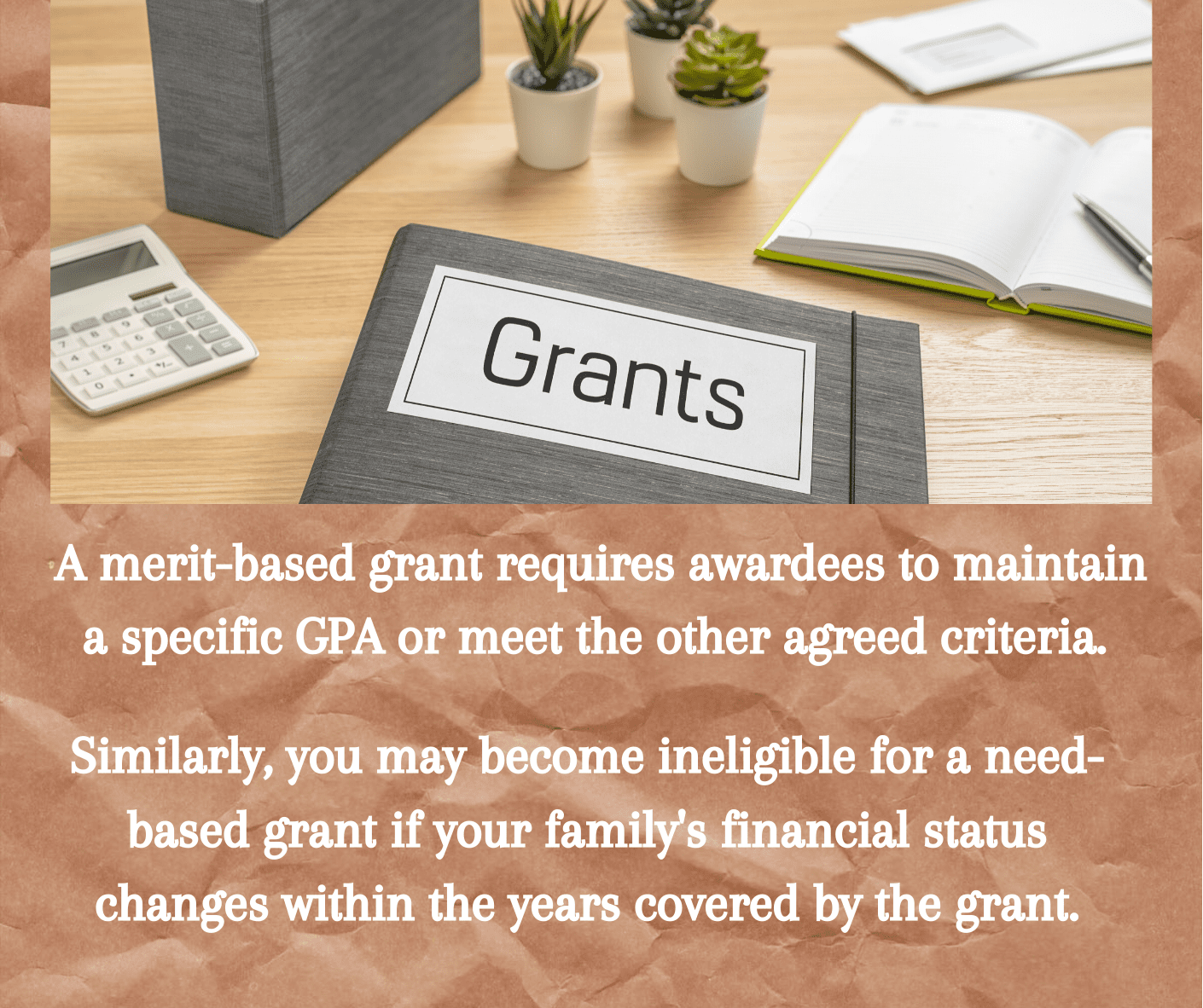
There are merit-based college grants, too. Eligible students need to have a commitment and balance between high levels of school performance (either in academic, artistic, or athletic) as well as service and leadership qualities. Merit-based grants carry a certain level of ‘prestige’ when you enter the job market one day. These large numbers of grants are being offered in every state annually and other organizations for students with exceptional achievement.

Popular Online College Grants
College grants are provided by a diverse source. Nonetheless, every grant ‘hunter’ has only one aim: to make their online college education accessible and aid them in their supplemental funds with all the information given by these grant references.
Federal Grants
Usually awarded to undergraduate students, the U.S Department of Education has the highest database of any grants and financial aids on the list. Offering an estimated $150 billion to 15 million students, the Federal Student Aid package includes grants, work-study, and loans as a combination. Determined by submission of Free Application for Federal Student Aid (FAFSA), the eligibility of the student’s high financial need and cost of attendance at school, among other factors, are prioritized.
This should be the first stop for grant-seeking American students with the common programs below:
Pell Grants
Formerly known as Basic Educational Opportunity Grant, it is a subsidy of the U.S. Federal Government and considered as the cornerstone of every student’s financial aid package. Named after Democratic U.S. Senator Claiborne Pell, these grants are offered to students coming from low-income families, applying for their first bachelor’s degree, or enrolled in post-baccalaureate programs through 5,400 participating institutions.
For determining the student’s Expected Family Contribution (EFC), Pell Grants have a standard formula in evaluating financial information stated by students on their FAFSA. Cost of attendance, duration of a participant in the college, whether if it is a full academic year, and if the student is full-time or part-time are considerations for the maximum amount of grant awarded to each recipient. As of the 2019-2020 award year, the maximum amount given was $6,195 for each applicant. With this, they need to sign a declaration that this is only for education-related purposes.
Federal Supplemental Education Opportunity Grant (FSEOG)
Based on your FAFSA submission, you can also qualify for an FSEOG if with the greatest unmet financial need. With this federal assistance, the maximum FSEOG given for an award year is $4,000 for each recipient and awarded on a first-come, first-served basis in their college of choice.
TEACH (Teacher Education Assistance for College and Higher Education) Grant
Created in 2007, it provides monetary aid coming from students in low-income families that have a passion for teaching. An example of an award-service program, education-graduate students will be deployed in a high-need field of study or critical shortage schools for four academic years. These high-need fields of study include math and science, special education, foreign language, and bilingual education. Approved applicants need to complete their TEACH Grant counseling and sign a contract- TEACH Grant Agreement to Serve- every year. It is estimated that qualified recipients may receive $4,000 annually.
Iraq and Afghanistan Service Grants (IASG)
This grant is exclusive only for students whose parent or guardian died as a result of U.S. military service in Iraq, Afghanistan, or after the September 11 attack among other eligibility requirements. Additionally, they should be less than 24 years old and enrolled at least part-time in college before the death of their parent/guardian. However, if the recipient is already qualified for Pell Grant, they are not eligible for this award. The maximum amount disbursed for each recipient between Oct. 2018-October 2019 was $5,810.

State-Sponsored Grants
Each state has its programs for grant opportunities for its resident students. Aside from federal grants, state educational grants are more on merit-based criteria. It also awards minority demographics like ethnicity, gender, and interests of fields with high-demand. As eligibility requirements for each territory differ, college-bound students can inquire about their state academic institutions for detailed information, assistance, and updates on these opportunities. Being qualified for Federal Pell Grant, students are automatically eligible for state-sponsored grants in member colleges. Some of them are mentioned below:
Colorado’s Department of Higher Education
The Colorado Department of Higher Education offers monetary aid to eligible students through both undergraduate and graduate education grants, dependent tuition assistance programs, and work-study programs, among others. These are only available in listed Colorado universities and colleges
New York State Higher Education Services Corporation
With a large number of grants and programs offered, it includes their NYS Math and Science Teaching Incentive Scholarship, NYS Educational Opportunity Program, and NYS Tuition Assistance Program.
Kansas Board of Regent
Qualified recipients on this grant have amounts that depend on their needs and availability. State-sponsored financial aid includes programs such as Kansas Career Work-Study, Kansas Ethnic Minority Scholarship, Kansas Nursing Service Scholarship, and Kansas Comprehensive Grant. Their grant has given amounts ranging from $200 – $3,500 at the private institutions and $100 – $1,500 at the public institutions.
Central Alabama Community Foundation
A charitable organization in their state, one of their primary goal is to assist in monetary needs for qualified undergraduate college students from underprivileged counties across Alabama.
College for All Texans
Through this initiative, state and college-bound students are being offered a wide variety of financial aid programs, which includes Texas Grant. Depending on need, type of college, and academic status, their need-based grant offers awards between $4400 to $7400.

Institutional Grants
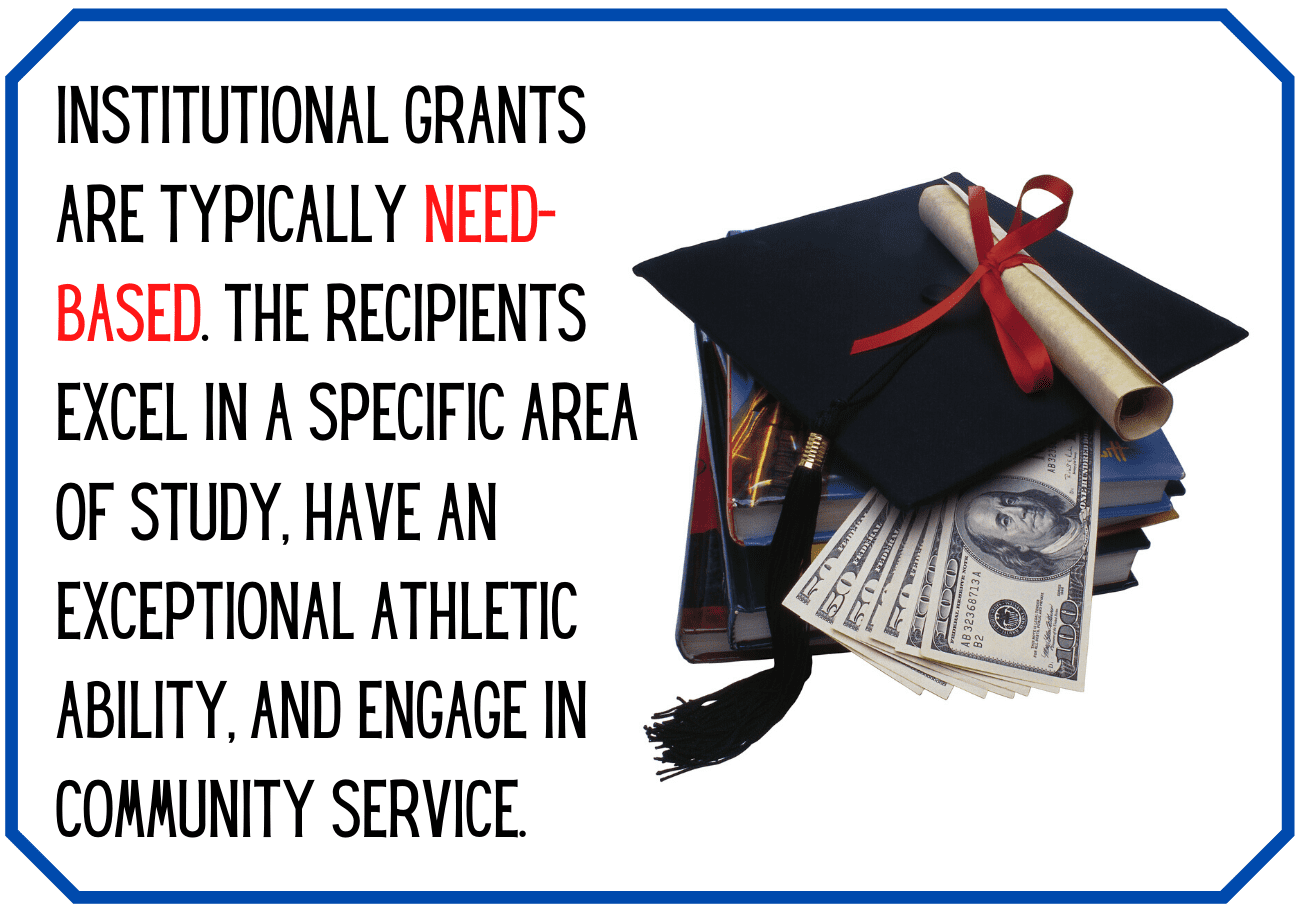
Grants that came from universities and colleges, these institutional aids are common at private colleges. These no-government academic institutions use these grants to attract a diverse student body and encourage top applicants.
Typically need-based, students who excel in a specific area of study, athletics, and community service can become recipients. In college-based grants, it may differ from one institution to another, so always get in touch with nearby schools for prospects of available financial aid. You may verify with your college department if there are available grants for your major. The following are some of the institutional grant listings:
Penn State World Campus
Under the famous Pennsylvania State University, it offers vast grant opportunities designed in specific for online students. Recipients need to maintain satisfactory academic progress during their program. Their online World Campus has the same financial aid given to campus-based learners.
Keiser University
Aside from Federal-related grants, the university offers Florida Student Assistance Grant (FSAG) and William L. Boyd, IV, Florida Resident Access Grant (FRAG). These additional grants provide tuition assistance to both full-time and Florida-resident students, among other eligibility requirements.
Wichita State University
Through its Office of Financial Aid, it gives financial assistance of around $100 million scholarships, loans, and student grants every year for eligible applicants.
Pacific Lutheran University
Their Alumni Dependent Grant is intended for incoming students whose parents also graduate in the said university. A maximum grant of $1000 is given to eligible recipients.
The University of Phoenix
With collaboration with non-profit partners, the school provides additional funding sources for prospective and current students. Grants amounting to $1,500 are available for qualified students.

Grants by Degree Level
Most grants are offered for the undergraduate level. However, some grants are available for graduate students. Undergraduate grants are more on financial need, whereas post-graduate grants focus on an area of expertise and are highly competitive. Aiming for career advancement, these organizations will fund your education, internships, and even research.
There are also private institutions that fund their work staff to obtain a master’s degree and a promise of salary increase once the degree is earned. For an employed aspirant, you can check with your company about scholarships and grant opportunities.
The Emergency Nurses Association awards nurses who want to pursue an advanced degree related to emergency medicine.
Recommended Schools

Course and Career-Oriented Grants
To fill the high-demand fields in the industry, career-oriented grants have increased in recent years. They are mainly focused on field study and specific career pathways and may be sponsored by the government, school, or private organizations. Some of them are the following:
Academy of Art University
More than $10 million grants and scholarship was awarded by this institution for visual artists by offering yearly its Portfolio Grant.
Graceland University
Located in Iowa, it offers programs such as Theater Production Grant, Founders Grant, and Art Performance Grant.
Nursing Scholarship Program
Through the U.S. Department of Health and Human Services, these are for students who want a career in nursing and will cover tuition and other fees. After they graduate, recipients will be required to work in a government healthcare facility with a nursing shortage. An additional monthly stipend is also included in the program.

Student-Specific Grants
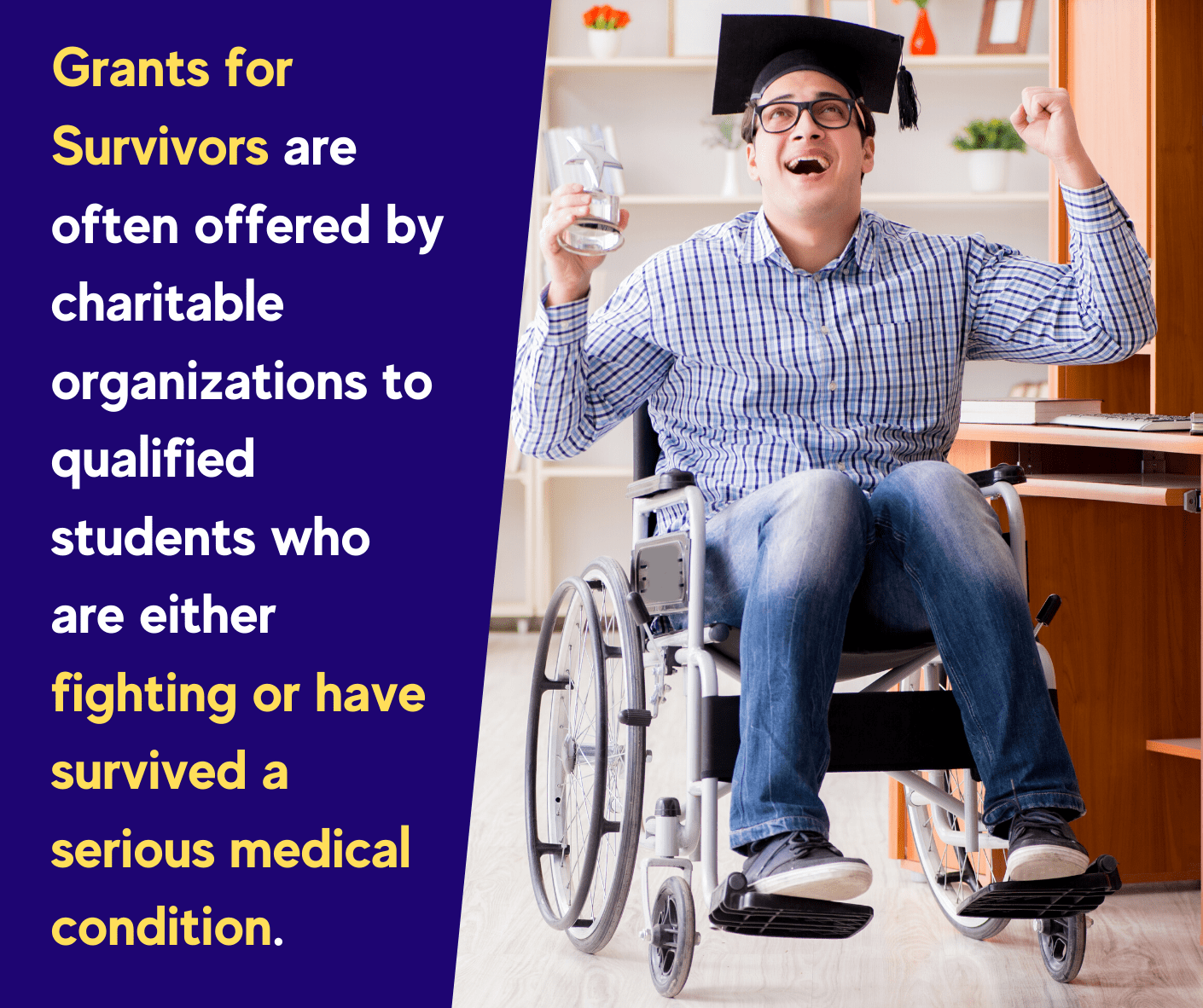
As the rate that the American population is growing, a diverse range of American college students emerge from all backgrounds. The grants for incoming college students are generally tailored to benefit specific categories of students to cater to their financial demands:
Grants for the Underrepresented Population
This program exists to serve the needs of these groups: women, disabled persons, and minorities.
For Women
Even though progress is being made for them, these grants are common among those in the working sectors as they promote gender equality in a male-dominated scene. For example, AAUW International Project Grants supports women and girls in the workplace once they return home from international commitment. With an award of $7,000, eligible applicants must complete an AAUW International Fellowship and all academic requirements.
Person with Disabilities
As mandated by the Individuals with Disabilities Education Act of 1975, grants for students with disabilities are designed to help applicants with specific handicaps. VSA International Young Soloists Award offers a grant for disabled musicians with exceptional abilities selected by the Kennedy Center awarding a maximum amount of $2, 000.
Minority Groups
Those who are qualified for higher education grants are African-American Native-Americans, Asian-Americans, and Hispanics. Sources- public and private- make up of their minority funding, which aims to increase college and workforce diversity. The currently available grants are The Korean Ancestry Grant, Iranian-American Scholarship Fund, Upakar Indian-American Scholarship Foundation, and Actuarial Diversity Scholarship.

Grants for Survivors
Being out of college because of a severe health illness can be devastating. These grants are awarded to such students who are either fighting or have survived a serious medical condition, not mentioning the emotional burden it carries. Most often, charitable organizations The NCCF Survivor Scholarship Program and Cancer Survivors’ Fund help pay their tuition and fees for free to achieve their dreams of higher education.

Grants for Non-Traditional Students
These grants are given for those returning to school after a long time and want to pursue a degree in later life. Often, they are single parents, especially women returning to college after raising a family. An example is ANSWER Scholarship Endowment, where they can choose between a four-year or two-year undergraduate degree with awards ranging from$2,000- $4,000, respectively.
Another source of non-traditional college grants is those enlisted in the U.S. military, including their service members, spouses, and dependent children to pay them for college. Missouri Vietnam Veterans Survivor Grant Program and the Massachusetts Public Service Grant Program are just a few of those who award eligible students.

Grants for International Students
For international students who want to study in America, there are programs available for financial aid. Even if it costs more for collegiate students abroad to study at U.S. institutions, these grants and scholarships are highly competitive, too. The Fulbright Program has provided 310,000 students to study, teach, and exchange ideas operating in 155 nations across the world.

Unique Grants
In searching for higher education grants, an interested student may be led to very “unique” opportunities. It can be an unusual and distinct hobby, skill, or interest that makes you stand out. These specific organizations are sponsoring such programs to arouse public interest and bring more attention as you both share the same passion. With this, consider what makes you different and unique as possibilities and chances are readily available in the corner.
Massage Therapy Foundation
Awards ranging from $1,000 to $3,000 are given to qualified recipients. Aside from research submission, the organization also aims to promote massage therapy for positive public perception and its role in health care delivery.
National Candy Technologists Scholarship
These are for college students with interest in confectionery. The organization offers $5,000 maximum, and a minimum of 3.0 GPA is required.

Will You Be Qualified for An Online College Grant?
A common misconception about online college grants is that most applicants have little to no chance of being awarded any. This situation yields interested students in weak spirits who decide to forgo their applications. In reality, a large number of federal grants are left unclaimed, amounting to $3 billion in total.
As every grant differs in eligibility requirements, it is safe to say that not all grants are need-based. With other schools and private organizations focusing on advanced education and specific criteria such as ethnicity or unique skill, there’s a grant that fits your needs if you know how and where to look. Some students go beyond the 15-credit semester and want only a part-time grant.
You can search for grants that are explicitly for part-time basis students, such as The Government Finance Professional Development Scholarship. While the amount may not be much less or equivalent to grants of full-time students, this scheduling flexibility can help such students in their other non-educational commitments.

Applying for A Grant
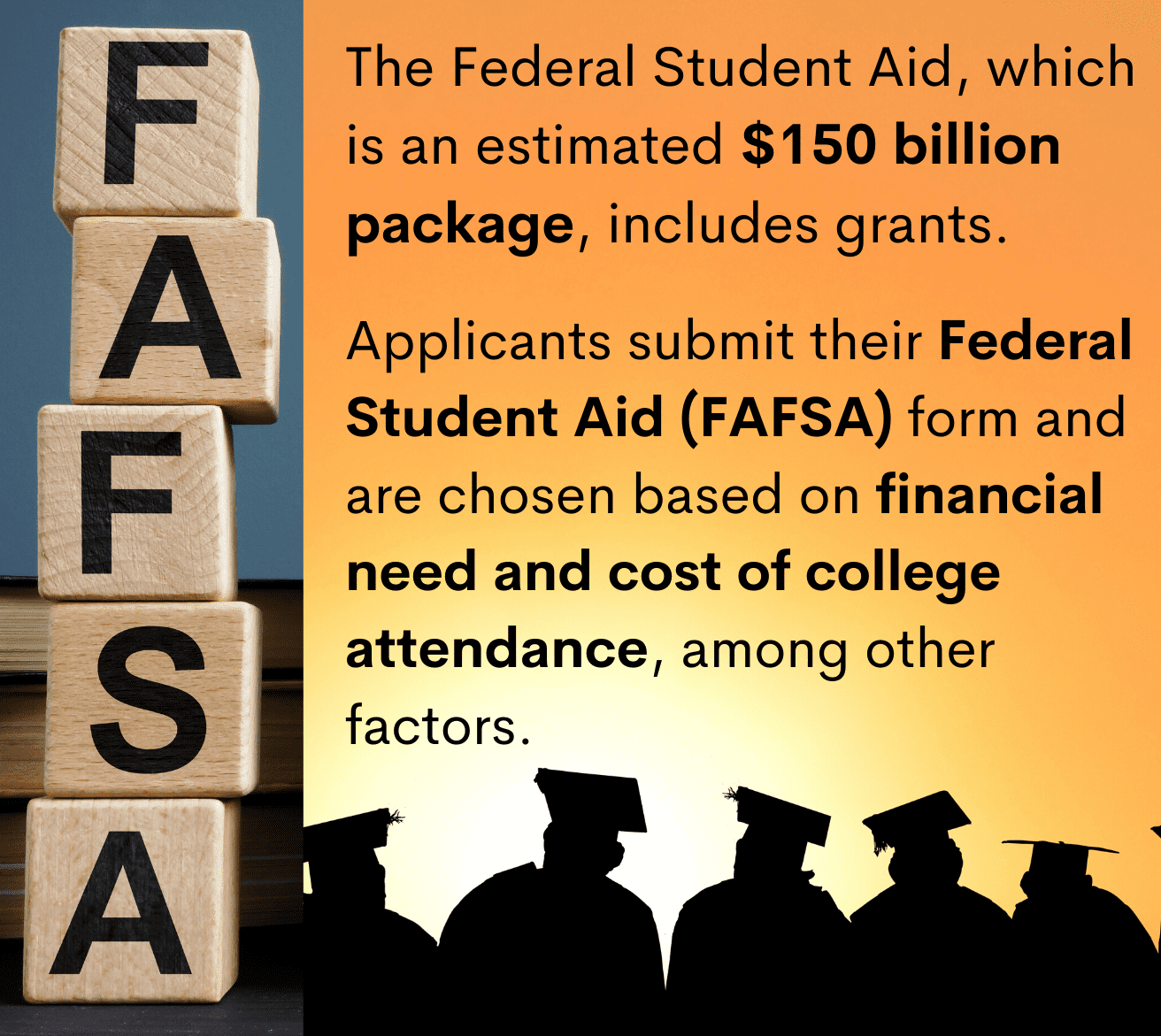
Grants are highly competitive like scholarships. Depending on how much college tuition you need, schedule your application at least three to six months before the given deadline.
In Free Application for Federal Student Aid (FAFSA), make sure you know the basic requirements and how you can be qualified in the future. As the first and most crucial step is the submission of the FAFSA form, a student must complete their application by following these steps:
Filling out the FAFSA
College grants are given by federal and state governments. To know your eligibility, students must fill out the FAFSA. Some state-sponsored and institution grants require additional eligibility and application requirements. For example, most grants have an academic requirement, like maintaining satisfactory GPAs. Through this, colleges will know the extent of financial aid and requirements you are qualified for. Also, market yourself in grant application with impeccable writing. Fund levels of federal grants are also changing every year.
Submission of FAFSA before the deadline
Complete your FAFSA early before the deadline as most grants are awarded on a first-come-first-served basis. Pay attention to each detail to avoid submitting an incomplete application. Also, be honest with every declaration. Don’t exaggerate your qualifications, memberships, and grades and present as they are. Set aside ample time to gather your documents, especially for your family income tax statements as they are most needed.
Assessing your financial offer
After finishing your FAFSA, colleges that accepted you will send their financial aid offers. Since you can only accept one offer, choices will tell you about your eligibility for other types of financial help like scholarships, work-study, and federal student loans.

Grants On Covering College Costs
How Much?
Grants vary from hundreds of dollars to full rides. Awards given for online college depends on the type of aid: need-based or merit. For a merit-based grant amount, the awards range from $1,000 on public schools to $35,000 in private schools. The merit-based estimate is around $5,000. As need-based aid is dependent on financial aid declaration on FAFSA, the estimates vary from one recipient to another. As in reality, your need-based aid cannot be greater than your financial need.
How Long?
While grants help ease your financial situation by covering your tuition and fees, they are not guaranteed to do that for you throughout your college years.
A merit-based grant requires awardees to maintain a specific GPA or meet the other agreed criteria. Similarly, you may become ineligible for a need-based grant if your family’s financial status significantly changes within the years covered by the grant. Your FAFSA information must be updated and renewed annually, and you can apply every year while in college.
Grant Repayment?
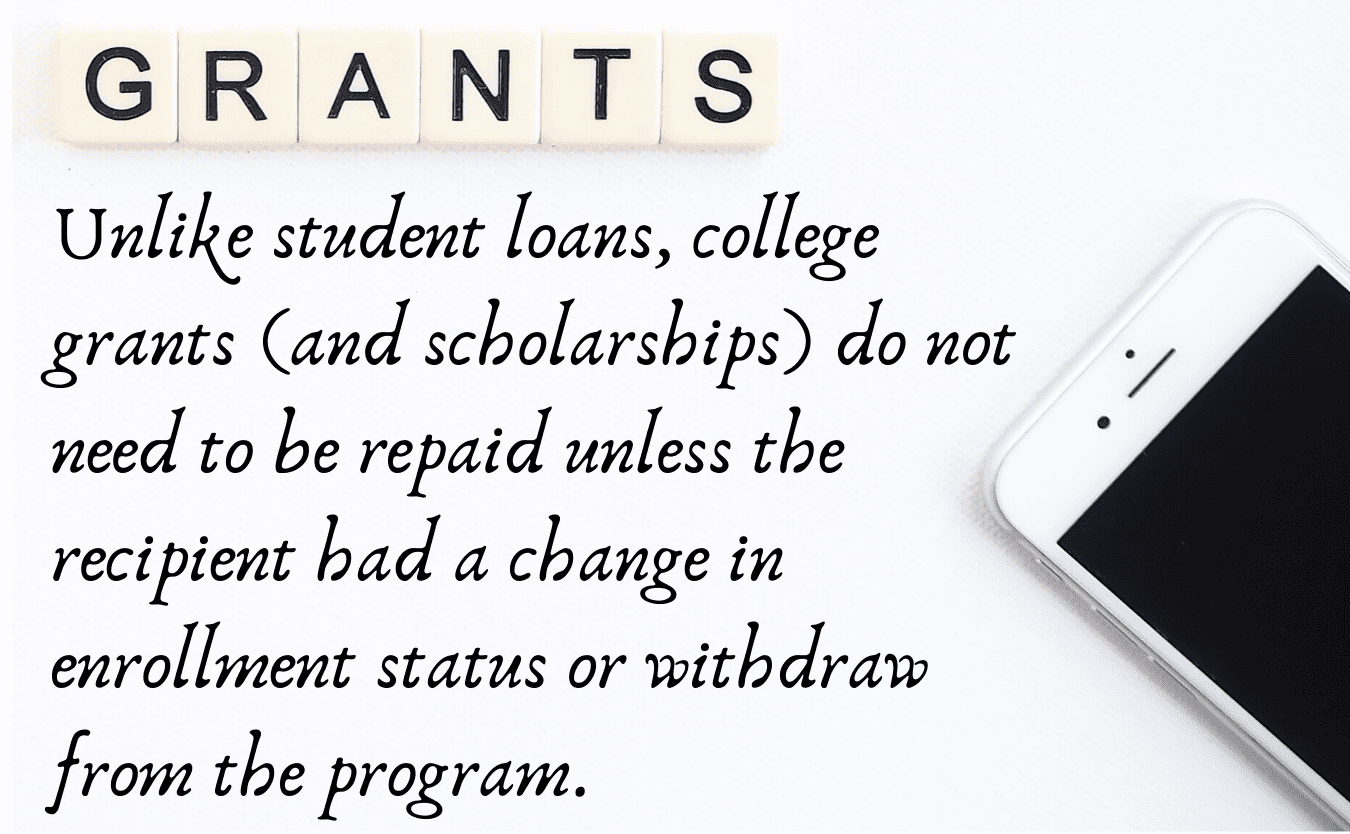
If grant eligibility cannot be maintained, someone from the academic institution or organization will notify you regarding repayment. Within 45 days, the student needs to enter in a satisfactory repayment arrangement or either pay portions of the total grant amount. Here are common reasons why you need to repay your federal grant:
- Early withdrawal from the grant program
- Received other grants (or scholarships) reducing the need for a federal aid
- Changes in enrollment status (from full-time enrollee to part-time)
- In course-based grants, not meeting the desired requirements (such as service obligation to TEACH Grant)

Finally, Remember These When “Grant Hunting”
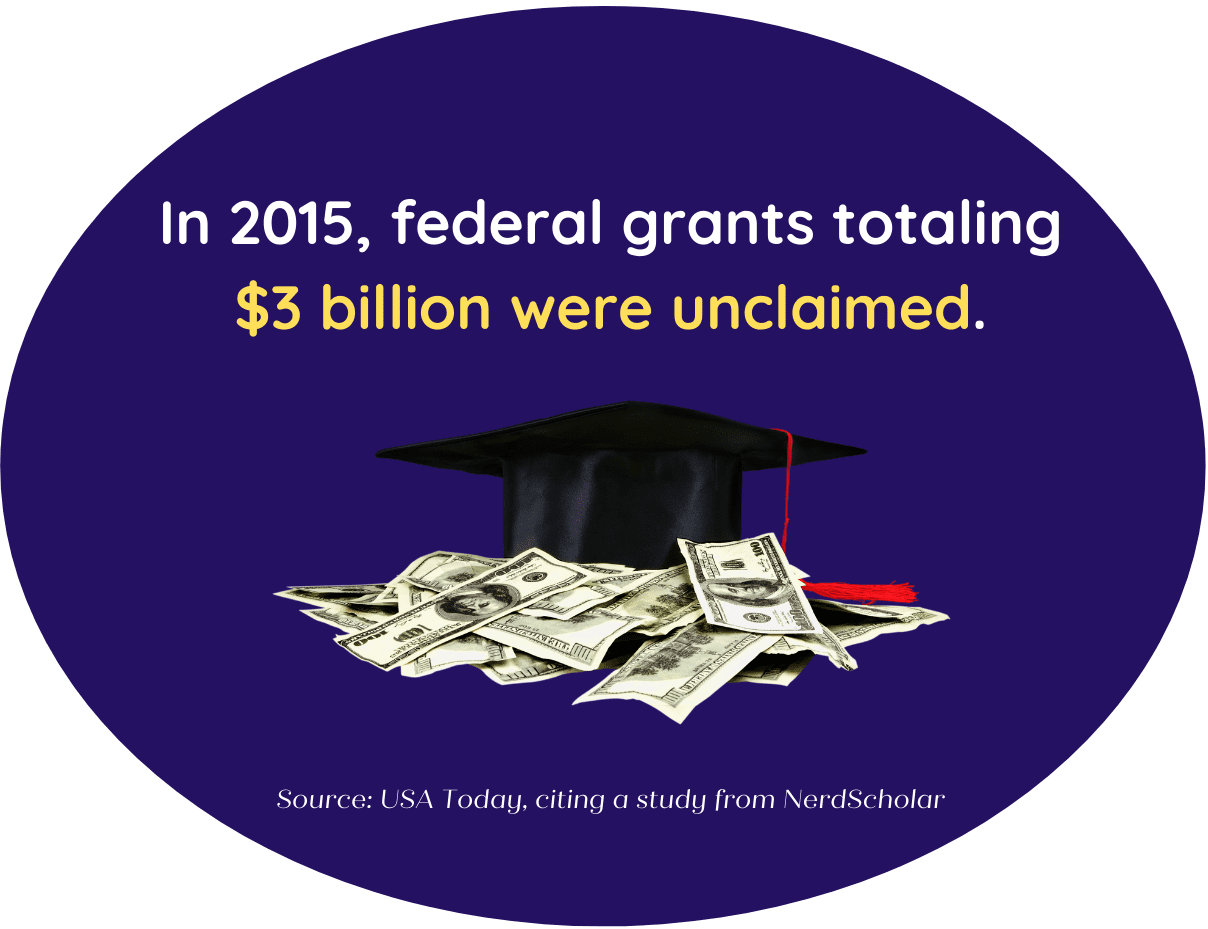
Along with the large volume of college students every year, you might as well be looking for free opportunities like everyone else. In such a highly competitive environment, you must also “hunt” for available online college grants to find the ones that are right for you.
Apply early and as often as you can. You can also ask for help from school counselors. Set your mind to complete applications for three hours a day and try to submit at least 20 applications a week. Through these strategies, you can search for many grant opportunities and not miss out on grants with small quotas. You can also try exploring these web sources:
Grants are not only limited to a small number of students. Even if grants are more of a financial need and support low-income families, another helpful way to be qualified is if you fall into one or more of the following, but not limited to, basic categories:
- Exceptional talent in arts or sports
- A disabled person
- A member of an ethnic minority or religious group
- Excellence in a specific area of study
- Past service to the U.S. Armed Forces
Consider a more flexible approach by not only focusing on your main subject of interest but to other related fields. For example, a grant for a specific online college may not be available in one state, but available in another. Such scenarios can help you weigh your options and decide on the best one that is available to you.
And finally, just apply! Look into the unusual places, and never ignore smaller scholarships. Don’t limit your options and remember that every grant is an opportunity not to be missed. With the right grant, higher online education can be within your reach!